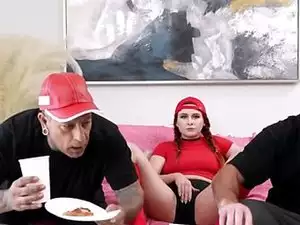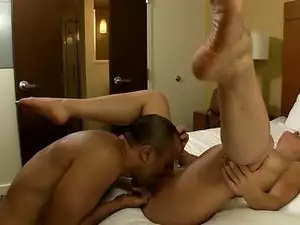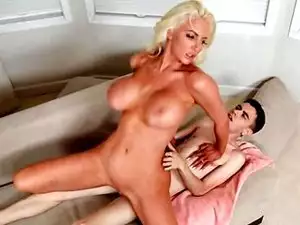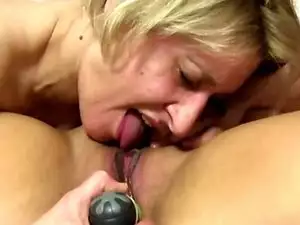Collateral
- 3 years ago
- 38
- 0

 3 years ago
3 years ago
= = = = = = = = = = = = = = = = = = = = WARNING! All of my writing is intended for adults over the age of 18 ONLY. Stories may contain strong or even extreme sexual content. All people and events depicted are fictional and any resemblance to persons living or dead is purely coincidental. Actions, situations, and responses are fictional ONLY and should not be attempted in real life. If you are under the age or 18 or do not understand the difference between fantasy and reality or if you...
 4 years ago
4 years ago
The day went by with Klaus seeing about his work, and Jake just observing from the corner he had been placed. Well, it was not exactly a corner, but it definitely felt like it. On the other hand, he was free to stare at the man, and that made up for everything.He had to admit he was pretty impressed. He heard Klaus talking on the phone in a language that he was almost certain it was French. The man seemed capable of switching between foreign languages without a problem, as he was talking to his...
 3 years ago
3 years ago
Assembling the bomb: Thinking back to my younger years and vacations by the ocean, I can remember the sounds in the middle of the night; the small waves lapping softly at the shore and on occasion, a larger wave would wash up, followed again by the smaller ones. That was how my stomach felt that Friday morning; small waves of nausea interrupted by an occasional larger one. Not quite causing a gag reflex or the need to empty the contents; I had done that already a couple of times. I swiveled...
 4 years ago
4 years ago
I had the hot for Saeeda, a friend of my wife. She had a great personality; she was funny and also very intelligent. On top of all that, she had a body that screamed for sex, full and luscious. My wife didn’t know it, but I really liked Saeeda. Saeeda was the mother of three teenaged children. At 38 years of age with three kids, Saeeda was still an attractive woman. Her large breasts had not yet started to sag, and her wide hips were not unattractively wide or flabby. On the contrary, she...
 3 years ago
3 years ago
Wednesday morning was more or less the same. The only exception was that the number of victims became more accurate. The rumor was that the rescued women were a mother and daughter, and both of them were pregnant. When that news came out, our town just died for a moment. The reporters would have liked to have questioned some people, but suddenly, there was nobody available. Nobody wanted to answer any kind of questions. So, the only source of information the media had was the feds. They...
 3 years ago
3 years ago
I was sure that neither Amy or Ruth noticed my absence, or if they did, they didn’t think anything about it. Nothing happened during the morning that was out of the ordinary, and by the time I could have my break enjoying the afternoon sun and country music, I had not seen any hints that my - or our - plans could have been compromised. I put my earplugs on and leaned back and concentrated on the message I wanted to send. This time it would be a long and detailed one, and I sent everything...
 2 years ago
2 years ago
Chapter FiveJake was getting restless. There was no TV or other means of entertainment he could use while waiting for that annoying bastard. He had a mind to just get out of the house, but he didn’t want Klaus to chase him down from the first day. There was enough time to observe his surroundings later. For now, he had to admit he was very curious about this insanely rich guy, at least by his standards, and his unusual interest in someone like him.The door finally opened, Klaus coming in with a...
 4 years ago
4 years ago
Summary: Jake meets one of Klaus's closest friends.It was almost dinnertime when he finally woke up. He had to remember to say an honest ‘thank you’ to that Agnes lady. His room was comfortable, and sleep had taken him fast, once he had hit the pillows. The bedroom was a tad smaller than Klaus’s, but it carried the same warm, cozy feeling. As opposed to the golden tones in the other’s bedroom, different hues of blue seemed to be dominant in this one. It was strange how he had always thought of...
 3 years ago
3 years ago
Summary: Jake is young, wild, and runs with his brother's bad-ass gang. But he has a secret he needs to hide. When he is saved from a rival gang by a guy with eyes blue as the summer's sky, all dressed up in an Armani suit and moves like Bruce Lee, the walls he carefully built around him start to crumble.***Jake had never been the type to fear anything for too long. It was either that way or his way. It was how he had been taught to think from an early age. His brother was in charge now, and...
 2 years ago
2 years ago
She was enjoying it now and her cries of pleasure grew louder. I increased my pace rapidly and Saeeda’s shrieks became more audible. Suddenly she arched her back, almost lifting me out of her. At the same time she grabbed my back, leaving a long trail of fingernail scratches on it. Saeeda surprised me that day by being so aggressive and assertive, very much different from her shy personality in her normal life. Publicly, with family she had a reputation of being modest, conservative prudish...
 2 years ago
2 years ago
She didn’t stop me. However, it was more than an hour later when she was coming down from her third orgasm, that I finally got naked myself. She had not been a virgin but according to her reactions, she had not been given oral pleasure very often, if ever. Instead of mounting her, I rolled her on top of me and helped her to sit. “Caryn, for the first time, I want you to be on top and make love to me.” I didn’t really wait for her response but instead helped her on top of me and guided my...
 4 years ago
4 years ago
Besides that one incident, the rest of Caryn’s pregnancy went without a hitch. We went through the training hand in hand, and I promised to be there with her all the way. Of course, her growing belly set some limits on our love-making but I did my best that what we lost in quantity was given back in quality - and intimacy. I massaged her tired legs and made sure that her stretched skin was well-treated with protecting oils. In response, Caryn did her best to be a loving wife who takes care of...
 4 years ago
4 years ago
The following morning I woke up hungry, and my whole body hurt. ‘Woke up’ was probably the wrong term, since I hadn’t really slept that well in the first place. My arm hurt whenever I moved. My left leg hurt and my back hurt. I should have been angry, but when I remembered what had happened, I just had to smile. The only drawback was that I had no food in my apartment. An hour later, I was inside my office. Only then did I realize that there was no way in hell I could get any breakfast from...
 3 years ago
3 years ago
In the early evening, I was the last one at the office, and the doors were already locked, when I suddenly got a feeling that I wasn’t alone in the bank. I managed to move away behind my desk and take my phone with me, when the door to my office opened. As I didn’t really know what to expect, I was more or less ready to fight. I wasn’t at all prepared to see Mrs. Bonner standing there, in high heels, with a dress ending a few inches above her knees, showing a lot of her shapely legs in shiny...
 3 years ago
3 years ago
Back in my small apartment, I found myself staring at my mobile phone. Without much conscious thought, I pressed the ‘Dial’-button. “Will ... Will, is that you?” “Yeah, Caryn, it’s me ... Sorry, I shouldn’t have called you at this late hour. I hope I didn’t wake Judy.” “That’s alright - but ... Will, are you drunk?” “As a skunk, actually.” For some reason, some stupid part of me found that funny and I giggled a bit. Then it hit me that she might see the reason of my laughter a quite bit...
 2 years ago
2 years ago
In a way, I should be thankful, since during the next two or three days I didn’t think much about my lost, loved ones. I was so sick from headache and continuous vomiting that I was not able to form a single coherent thought. Okay, I would have liked to beat that bastard - Mr. Greg Older, who pulled me out from my self-destructive misery - but he was too clever for that, and he made his wife Laura take care of me. So, instead of beating anyone, I found myself apologizing to her all the time,...
 3 years ago
3 years ago
The following week, I did another extra shift on Tuesday, and I could almost feel how there was always someone following me. I made sure that I just did my job and did not ask any unnecessary questions, nor did I try to keep track of what was happening there around me. Close to the and of my shift, Ken came to me and asked how I was doing. I just shrugged. “Okay, I guess. These extra shifts help a lot if I ever want to move away from that shithole I currently have.” “What’s wrong with...
 4 years ago
4 years ago
When I left the hotel on Saturday morning, I could almost feel the looks from the hotel staff. Whatever, I was quite sure that I’d never again visit that hotel, anyway. Next Monday morning, I dropped all my extra gear back at Noelle’s desk and she stopped me before I could go to see Greg. “Will, Mrs. Seiler is in our own meeting room and she’d like to see you.” “Okay - and thanks, Noelle!” On my way to the small meeting room we had there, I wondered why Mrs. Seiler still wanted to see me....
 2 years ago
2 years ago
The following morning I had an early breakfast, before returning to my room and working intensively for the next hour and a half. Then I called Noelle and let her know my program for the rest of the day, before starting the two-hour drive back. My first meeting was with a makeup artist whom we had been using during our undercover operations. To call her a makeup artist was quite an understatement of her skills, since besides being able to make a temporary change to your looks, she could...
 3 years ago
3 years ago
The common breakfast was a strange event. The good thing about it was I got confirmation of the number of the people who formed ‘The Group’ and lived on this ranch. There were about ten men present, which equaled a total of twelve. All of them were in their mid-thirties or older, and they all seemed to be in good physical shape. What surprised me was the number of women. There were more than twenty women; the youngest of them were barely in their teens, and even the oldest were probably under...
 2 years ago
2 years ago
When the evening came, I had finally moved all my meager belongings to the quarters Ruth and Amy were occupying. During the evening meal, I could see all the men chuckling when they watched Ruth circling me - while I tried to look totally oblivious about the whole thing. When it was time to clean the tables, Matthew came to me carrying something. “John, I heard that you lost the charger of your MP3-player. I hope this one fits since you certainly will earn some peaceful moments in the back...
 5 years ago
5 years ago
Even though Louise was not big girl and probably weighed just barely over 100 pounds, I really started feeling the extra weight by the time we reached the gate. I used the rest of the glue on the lock, but I was sure it would not stop the authorities once they found the tunnels. Once we started climbing, I was soon breathing hard. It didn’t really help that Louise was awake and complained all the time about the torture she was being put through. I thought about stopping and gagging her, but I...
 2 years ago
2 years ago
I didn’t see much of Jeanie, but I heard that she spent most of her time either studying - or in therapy. Therefore I was surprised when one Monday afternoon there was a knock on my office door. As soon as I had opened it, a whirlwind that reminded me of a girl named Jeanie rushed into my room, pushed me into my chair, and landed all the way onto my lap. “You’ve been avoiding me, Will!” She gave me a sulky look which she tried to make look false, but I could tell that she didn’t really need...
 3 years ago
3 years ago
Tuesday morning, I was finally in my office and I was about to start looking at what I should be doing next, when Laura entered my office and closed the door behind her. “Will, I’d like have a few words with you.” “Just tell me how can I help you, Laura.” I didn’t like the smile that formed at the corner of her mouth. “Jeanie told me.” Even though I knew my face didn’t reveal anything, my mouth suddenly felt dry. Yet, I was not sure if Laura really knew something, or if she was fishing...
 4 years ago
4 years ago
While we waited for the enforcers to arrive and sat there at the poker table, eating, drinking, and smoking, I noticed that Mom squirmed a bit in her awkward nudity. She knew enough of the new slavery laws to know that she had sealed her own fate. After she was coded, collared, and more than that, she would have no rights at all and would legally be a possession, nothing more than that. She was chattel, her own son’s property, no less. “Well, now that the fidelity issue is resolved, in favor...
 2 years ago
2 years ago
“You know what would be fun, babe?” Tiffany asked me after our slaves had both sucked and licked us for a little while now. “Swapping slaves for a little while so your parents can serve me while Steve and Mom do the same for you?” I guessed. “That’s fun, true, but what I meant was for you to impregnate Mom, me, and your mother. At about the same time, as close as possible. Imagine all three of us being pregnant to you at once! All three ladies in your house. I would love it if Dad and Steve...
 2 years ago
2 years ago
“By the way, Mistress, you could never have married Master Bruce,” Karen suddenly informed her daughter/owner, just as Steve began pounding Dick for his turn. “Why not?” Tiffany wondered with obvious shock and chagrin that the option might be foreclosed to her by some obscure issue. “Because while incest laws have been relaxed for chattel bondage, the marriage statutes still strictly forbid siblings to wed,” Karen let that bomb drop suddenly, along with my stomach and Tiffany’s. “What?...
 3 years ago
3 years ago
I awoke hours later to the sound of Dick grunting as he rammed Steve’s butthole pretty damn hard in the vanity with his stiff rod. It was clear that they were acting under the orders of Tiffany, while Mom went to bring Dylan’s car back to him. Karen, however, was still in bed with me, and her apparent task was to snuggle with me under the covers. She seemed to dig it, too, judging from the way that she smiled at me and kissed my face repeatedly. “Oh, God, how did I get so lucky, Master?”...
 4 years ago
4 years ago
“Excellent breakfast, Mom,” I told my mother after she made fantastic Eggs Benedict with the proper Hollandaise sauce. Mom blushed as she sat on my lap and felt my hands fondle her buttocks during breakfast. She leaned over to kiss me on the lips and I gladly accepted her tongue as it slid inside my mouth. We made out for several minutes, my mother and I, but we finally got up for air when we heard some coughs and giggles. It was clear that we had an audience, after all. “Save that for me,...
 3 years ago
3 years ago
“Shall we have a meeting?” Kevin Humphreys asked the hundreds that were gathered. Jenny had given John a hug just after Dar took the bag of black boxes for Vid and the Russian Space Program, “What are you smiling about?” “I think the two Presidents may have bonded.” John smiled as he looked in Jenny’s eyes. “I agree, that’s worth smiling about.” Jenny gave John a kiss. Reverend Jacob approached John and Jenny, “I’m calling for volunteers to fly home and see how much damage we got. From...
 2 years ago
2 years ago
"Thank goodness it's Friday," said Mary. "You got that right," added Kevin. Mary and Kevin were on their way to dinner and then to a movie. They both had had a grueling week and looked forward to a relaxing evening out. It was July, it was hot and Kevin had begun to perspire. As Kevin fiddled with the truck's air conditioner Mary went down a mental list of restaurants that the couple liked. Kevin couldn't help noticing Mary's sexy legs as he adjusted the air. They were covered...
 4 years ago
4 years ago
It is the end of a very long day of a very long week. Seems every other call and visit involves an intense flu virus that’s sweeping through our county like an invading army. Few escape untouched.Susan walks in for the last appointment of the day looking like one of the recent victims. Classic symptoms, a story heard a couple dozen times today. After listening to her symptoms, a simple exam looking for bad beasties in eyes, nose and throat. Moving behind her, a light touch to neck glands brings...
Supernatural 3 years ago
3 years ago
I remember sleeping about five inches from the ceiling. Coffinesque. I went to sleep stifling an endless scream. My brother was in the lower bunk. I fell once but don’t remember the circumstances. I dreamed of men. Famous ones. Ones my friends say would be good for me. I broke his things when he was gone. I’d slip into our closet and find seashells he collected, just one or two, not instantly noticeable and take them to the laundry room in the Big House, as the girls call it. I’d take one at a...
 4 years ago
4 years ago
Four days afterwards i could see there son sniggering as i walked up my path and into my house, i was filled with rage and anger. At times the younger children next door use to shout and scream, i could never get any peace and quiet, i felt i was being hounded and tormented by my neighbours children. It was no use having words with there mother, she would'nt have a word said wrong about them, she see's them as angels, unknown to her i seen what her eldest son did to my car that night. ...
 2 years ago
2 years ago
Brain Damage I had a job and worked everyday after school, I had more money then most of my friends, and rode a new motorcycle, I liked girls and spent more time with them, then I did hanging out with my guy friends, I enjoyed there company and almost always had some girl with me, I liked to open doors for them and tell them they were beautiful, I bought them flowers for no reason and took them out on dates. At eighteen, I had long hair, rode a nice motorcycle, and had girls around...
Incest 4 years ago
4 years ago
Edited by George5. Of course, I had to screw with it afterward; so all missing steaks are mine. My marriage was destroyed and my anger peaked and was sustained by a power outage. Then another storm helped make some repairs. My name is Carl Arthur Thomas and at the time I was destroyed I was 29 years old and had been married for 5 years. We had no kids and had not talked about starting a family. I am 6’ 1/2” tall, blue-eyed, 180 pounds, and prematurely gray-haired. I am told that the gray...
 3 years ago
3 years ago
Katie Jackson slowly opened her eyes as her clock radio played some rock-n-roll. As she reached out to shut it off, she winced in pain as her arms ached. She lay in bed as she took a hold of each forearm and began to massage them. The muscles burned from stroking Phil Dorman’s cock with reckless abandon until he squirted his cum squarely in her face. Mrs. Jackson sat up in the bed and tried to clear her head. She regretted everything the past few months such as not paying her insurance and...
 2 years ago
2 years ago
Marcus Anthony was shocked when Chris Beaker spoke to him from the air but his mind worked fast, in the first few seconds of the attack he realised that he was outmatched. He quickly ran through the options and realised that his best defence was to vanish. Creating a solid copy of himself he quickly faded into the wall of his office and watched the battle take place. He only gave his copy enough power to fight back, but this was only to make Beaker waste power until he couldn't fight back...
 2 years ago
2 years ago
Copyright© 2006 by Kien Reti It was after midnight on a dark street in an unsafe neighborhood, but he felt perfectly safe. And, why not? After all, Macduff was a 6'-3" muscular male in the prime of life, and trained in the martial arts to boot. There was no excuse for being taken by surprise. "Fucking careless!" was the last thought that flashed through his mind before his head exploded. "Sir, can you hear me?" the distant voice asked. His head hurt. He hurt all over. And there was...
 2 years ago
2 years ago
At Christmas of 2007, I split my time between Peter and Nicole. LA and New York are big cities, major metropolises, but outside of the definition, I don't think you could find two places on earth more alien to each other. It was invigorating – or at least it had been – visiting both cities in the course of December in past years. New York was often snow, frigid winds, surly cabbies and plays; LA a few days later was 70 degree/shirt sleeve weather, hookers in hot-pants on side streets, and...
 3 years ago
3 years ago
The lure floated through the air thirty feet before landing with a plop in the water beside the cattails. It created little ripples that disturbed the calm surface of the water. The still air carried the sound a great distance. Ray grinned upon seeing it land exactly where he had wanted to place it. He turned the crank to retrieve the lure while making jerking motions with the rod. He knew if there was a fish there that it wouldn't be able to resist it. It was approaching the magic hour when...
 2 years ago
2 years ago
It was a late evening, when I came back home. Suddenly someone knocked on the door. I didn’t expect anyone, the rest of the family should be arriving later. It was my nephew, a 15 year old good looking boy. “Hi sweetie, come in, unfortunately no one else is here, but if you don’t mind waiting, I can give you some drink and a delicious cake”. I haven’t seen him for quite some time. He became a handsome little man! We had a nice conversation for a moment, but I had to leave him alone to prepare a...
 4 years ago
4 years ago
The Pirelli family attended 10 o'clock Sunday morning Mass regularly. This Sunday was no exception. They were all dressed in their Sunday best because Martin insisted they not dress casually for church. The entire family, except Angelica, sat lined up along one of the pews of the old cathedral. But Mia's mind was not on Mass, it was on the dance Friday night, and Riley Bills. She couldn't stop thinking about Riley and when she wasn't thinking about him she was thinking about her mother....
 4 years ago
4 years ago
Rough Video Booth Sex - Part 1I was horny as hell, and I wasn’t sure why. I should have been exhausted. It was almost 2:00AM, and I was driving home after delivering furniture 100 miles away. It was a part time job I got for the summer, between college semesters. Meandering down a country road, I was surprised to see a sign lit up, advertising Adult Books, Video Booths, Toys, Movies, and More. I pulled in, figuring I’d check out a couple videos.The place was empty, except for the worker...
 4 years ago
4 years ago
Gypsy PrideBy Sonya Esperanto [email protected]: About a gypsy high schooler who had fallen to the trap of a bunch of skinheads, who decide to teach this Roma a lesson about manners and what gypsies ought to be good for.Story:Classes were over. But even if it was, to Tom and Jerry, it meant nothing. Tom and Jerry were two skinheads who came to school and even hid the truth from their teachers, that they listened to white power music and hated blacks and mulattos. Tom and...
 2 years ago
2 years ago
Hello ISS reader. Mera sab iss reader ko namaskar.mera nam viney hey, men sec1 ka rehene wala hun. I am 26 years old.mene iss men bahat sare stori padh chukahun , usmen mujhe kuch sacha lagtahey ,au kuch jhut. Magar men ajj apko mere eak sachi kahani sunane jaraha hun. Undino sardiyo ka mosam tha. Mera dost neeraj hooda aur main aksar chocho(corex) maar k baitha karte the.neeraj dekhne mein bahat sundar tha.unki age 28 thi. Aur unke chutad bahut hi chikne chikne the. Neeraj ko dekh ke mere dil...
 2 years ago
2 years ago
Amy opened her eyes and grinned at him. "Does your girlfriend let you fuck her ass?" she asked, in the matter-of-fact tone he was getting accustomed to.Mickey shook his head. "No...fuck no." He groaned again as she pushed down, slowly taking more of him inside her. He had tried once with Becky before but had got barely an inch inside her before she stopped him. That had been his only experience of anal sex until now.She smiled. "How does it feel then?"Mickey nodded. "Fucking incredible. Jesus,...
 2 years ago
2 years ago
Penelope Kay and her friend Anna Claire Clouds are getting ready to go on a ski trip. When they strut into the living room in their matching outfits, Anna Claire’s stepbrother, Alex Mack, mocks their choice of clothing. The girls disappear and try again with somewhat more appropriate clothing, but Alex still isn’t satisfied. When he tells them to try again, Penelope whispers an idea to Anna Claire. They disappear once again to change, but this time they take their time. Just as Alex...
xmoviesforyou 2 years ago
2 years ago
Introduction: Me and my best friend Jims first time Dear Diary, I was looking at this hot chick with a huge rack at my Denver High. I walked the halls to try to get a bit closer to her, I couldnt hide my boner, it was bulging right out of my jeans. I walked like a cripple for a while until I turned the corner. I bumped into something big and soft, it was her. I was so embarressed, cuz maybe she felt my boner on her warm ass. I was shocked and I started panicking and looking side to side. She...
 3 years ago
3 years ago
I woke up before dawn, seeing from Julie's alarm clock that it was almost seven o'clock. I slipped out of bed quietly so as not to wake Julie and Vee, and threw on some clothes, using the glow of the streetlights through the curtains to find everything. By the time I was dressed, Julie had rolled over - still fast asleep - and was cuddling Vee for warmth and company. I presumed that her period - now in its third day - was still making her feel uncomfortable, and considered making her a...
 4 years ago
4 years ago
I excused myself for a pee break. I was in the stall for a few minutes, sitting there nude, when I heard a tapping on the door. I looked under the divider and saw four naked feet, obviously men. I blurted, surprised, "Busy in here." I thought that would do it, but I was wrong. "Aw come on Cindy, let us in to watch?" A feeling of panic. "No, sorry." "No? You don't say no, you've been doing everything!" I said nothing. "Do this too, hmmm sweetcheeks?" I thought a moment. Why was I resisting? As I...
Group Sex 2 years ago
2 years ago
Bosom buddies and lesbian lovers Ella Knox and Gabbie Carter sizzle on screen together in this DDF premium glamour porn triple-X exclusive. The two sexy American college babes are lounging in their lingerie in the bed, and their curvy bodies are a true treat for your eyes to feast upon. Join the deliciously juicy and big jugged jezebels as they decide to play naughty with each other being that Gabbie’s boyfriend is at work. What transpires is something so hot that you’ll have your...
xmoviesforyou 3 years ago
3 years ago
Hey everyone thanks for your comments and love on my previous writings. Thanks to ladies/gentlemen for your approach. Hope you are having fun. Keep dropping your views @ I am writing this on behalf of one of my reader and a very good friend ‘ Munira ‘. Hope you like it too baby. Little long but sexy and with lots of emotions. Time to get back to story It was end of November and I turned 24. Marriage plans were on cards but not specific with time. I got a proposal with all qualities I...
 3 years ago
3 years ago
My husband and I are in our late thirties. I'm Hispanic, petite and stand 5'2". My husband, Donnie, is black and has an athletic, stocky build. He stands a little over 6'0". We both try to keep ourselves physically fit. We have been in an open relationship for a few years now. We'd been married for over ten years before we decided to live out our sexual fantasies. My fantasy was to be with a young, fine white boy who could put it down in bed. Donnie's fantasy was to watch me have sex with...
Wife Lovers 3 years ago
3 years ago
After my father-in-law died, my wife's mother Dorothy came to live with us while she got her affairs sorted out. She stayed with us for almost two years during which she and I had a sexual affair which fulfilled her needs and all my fantasies. After she moved out into her own flat, she and I continued to see each other but she of course had other relationships as well. After Dorothy had lived in her flat for about a year she decided to change around some bedroom furniture, and my wife Caroline...
 2 years ago
2 years ago
My last fantasy: I wish I were Marcos Raquel was a 34 yo Spanish woman. She has been married for 16 years now while her husband was 40, a sterile guy, so they don’t have any kids or progeny, they’ve been a happy couple though.Passion has cooled off between them by lack of enthusiasm and stimulation. But this ‘problem’ began to change since a year and two months ago, to be more accurate, as a couple’s pal had gotten to their homes to spend a few days here, in this city where the couple lived...
 3 years ago
3 years ago
I have taken hours to prepare for this meeting. First a long shower, as hot as I can stand so that when I look down I can see the rivulets of red skin where the water has run down my body. The music in the bathroom is A perfect Circle. Never fails to put me into one of the most erotic moods, not that I needing much help with that. I step out of the shower drying off looking in the mirror checking all the places making sure I didn't miss a spot in my shaving. Never one to spend time on hair...
 2 years ago
2 years ago
Es ist 23.15 Uhr... Ich sage immer: lieber früher, als zu spät! Ich gehe unauffällig in das Haus unserer Nachbarn (durch die Terrassentür, die netterweise für mich geöffnet war)... Ich entscheide mich, zuerst in das Zimmer der Zwillinge zugehen... Vielleicht ist die Nachricht auf deren Misst gewachsen. Ich höre schon Geräusche aus dessen Zimme... Schließlich bin ich angekommen, stehe vor dem Zimmer der Zwillinge, kurz davor die Klinke zum Zimmer runter zu drücken und das Zimmer zu...